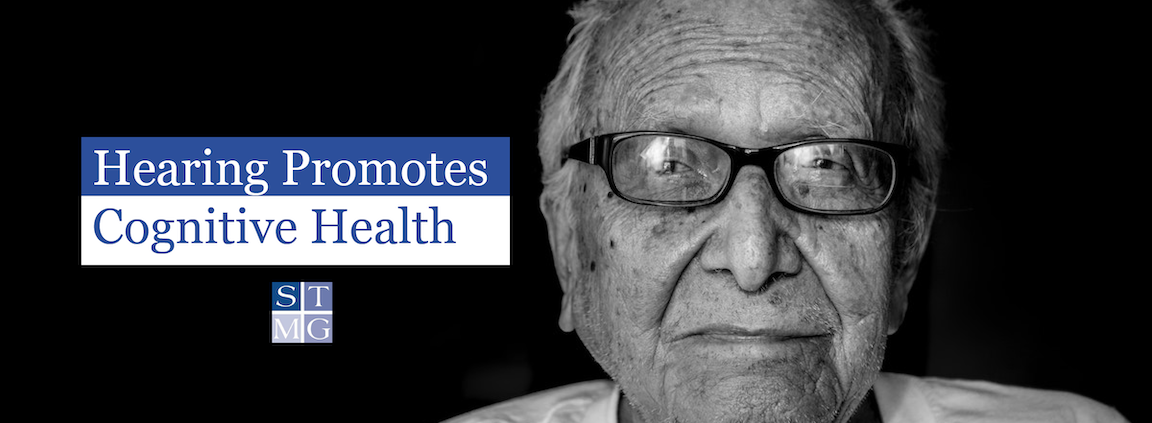Being Able to Hear Promotes Cognitive Health
/in Uncategorized/by Nicole ClawsonOver the course of a lifetime, there are millions of reasons why you want to have the ability to hear: a beautiful piece of music, the words of a loved one, or a life-saving alarm. It’s no overstatement to say that hearing is an absolutely critical and integral part of human life.
The relationship between hearing and our overall health is highly complex, affecting the physical, mental, social, and emotional. Researchers have even pointed out a connection between hearing loss and cognitive decline, which may contribute to dementia. As it would seem, hearing – or lack of hearing – can affect our health in a multitude of ways.
Hearing Impairment & Cognitive Impairment
While a variety of studies from over the years have examined the relationship between hearing loss and cognitive health, a meta-analysis published in February 2018 examined the results of 11 studies conducted in recent years.
The meta-analysis found that older adults with moderate to severe hearing impairment had a 29 to 57 percent increased risk of cognitive impairment when compared to their peers with normal hearing.
Another study published in JAMA by researchers at Johns Hopkins notes that cognitive decline happens faster among people with hearing loss. A study of nearly 2,000 volunteers over the age of 70 found that cognitive decline occurred within an average of eight years among those with hearing impairment, while adults with normal hearing did not begin to experience cognitive decline for approximately 11 years.
The nature of the relationship between hearing impairment and cognitive impairment is not fully understood, however it may be fair to at least speculate that…
- …reduced hearing limits a person’s ability to engage in social activity.
- …hearing loss may result in less brain stimulation and engagement with the environment.
- …the extra effort directed toward attempting to hear may detract from other cognitive activities.
Can Hearing Aids Help?
Research surrounding the question of, “Do hearing aids help prevent cognitive decline?” can be a bit conflicting. Some studies have reported that hearing aids do not reduce risk, while others report that use of hearing aids can delay or prevent the development of dementia. In the case of both sides, however, it’s extremely difficult for researchers to know whether or not study participants are using their hearing aids as reported, as well as whether or not the hearing aids are properly calibrated and serving patients to the best of their potential.
Whether hearing aids reduce risk of dementia or not, there’s no arguing that their role in improving a patient’s hearing can be quite beneficial. Furthermore, it’s reasonable to believe that adults who can hear better have more opportunity to engage with other individuals and their environment, thereby stimulating the brain and cognitive activity.
Want to Learn More About Your Options for Dealing With Hearing Loss?
If you answer “yes” to any of the following questions, it may be time to schedule a hearing test.
- Are you 60 years of age or older?
- Have you recently experienced trouble with hearing?
- Do you hear sound even when no external noise is present?
Schedule an appointment with one of our audiologists at St. Thomas Medical Group in Nashville by calling +1 (615) 292-5191. There are many options available today. Much has changed in hearing aid technology – these aren’t your mother’s hearing aids! Whether you’re looking for something discreet, affordable, or powerful, our audiologists can offer assistance.
Bonus Resource: Understanding Hearing Loss
Nashville audiologists at St. Thomas Medical Group have created this guide to help patients understand how hearing works, as well as some of the distinctions between different types of hearing loss.
Fight Ragweed Allergies In Nashville!
/in Uncategorized/by Nicole ClawsonFor many Nashvillians, August and September mark the unofficial end of summer and the start of the back-to-school season. Fresh starts, new beginnings, new seasons… but it’s not all rosy. No, in fact, for many residents of Davidson County and surrounding areas, August and September bring the much-dreaded ragweed season.
What Is Ragweed?
Ragweed is a flowering plant that makes many who suffer from Nashville allergies think, “I guess spring wasn’t so bad after all.” Yes, ragweed really can be that miserable, bad enough to make Nashville’s spring allergies seem manageable. (And that’s saying a lot, considering that Nashville ranks in the top 30 cities in the U.S. for allergies.)
Ragweed’s 17 species produce a fine-powder pollen beginning in the Southeast region during late July / early August. The plant’s bloom cycle continues north and to the west as the weeks progress. Though ragweed season is the worst in Nashville during August and September, the plant often remains active into the month of November. Individuals who are especially sensitive to ragweed may be affected until cold weather season settles in.
If you’re allergic to ragweed, it may not give you much comfort, but know that you’re in good company: three out of four people with allergies are allergic to ragweed.
What Are the Symptoms of Ragweed Allergies in Nashville?
Also known as “hay fever,” ragweed allergies can produce many of the symptoms typically associated with rhinitis (inflammation and swelling of the nose’s mucous membrane), including:
- Sneezing
- Itchy or runny nose
- Nasal cogestion
- Irritated, watery or puffy eyes
- Itchy throat
- Sinus headaches and pressure
- Trouble sleeping
In individuals with asthma, ragweed can exacerbate symptoms, resulting in worsened coughing and wheezing.
What Can I Do About Ragweed Allergies?
It’s you vs. the one billion pollen grains that every ragweed plant has the capacity to release. (Multiply that times the number of ragweed plants in the area!) But our team at St. Thomas Medical Group is on your side. Here are a few ways you can fight back against ragweed allergies.
#1 Avoid These Foods
“Avoidance therapy” is one of three common approaches to treating allergies. Of course, it doesn’t help much to say, “Avoid ragweed,” as the pollen spreads everywhere. (That being said, you will still want to try limiting or avoiding time outdoors.)
You can, however, avoid certain foods, whose plants contain pollens similar to ragweed. These include banana, zucchini, sunflower sees, cantaloupes, cucumber, and others.
#2 Additional Methods for Reducing Exposure
For people who suffer from ragweed allergies, the best thing you can do is to reduce your exposure to the pollen. Follow these tips as best as you’re able:
- Use HEPA air filters in your home HVAC system to help prevent pollen from entering the home.
- Don’t air dry clothing or sheets on an outdoor line where they can pick up pollen.
- If you spend an extended amount of time outside, remove shoes and clothing before entering the house so that pollen doesn’t track inside.
- Wash outdoor pets regularly to limit pollen from entering the home.
#3 See an ENT/Allergy Doctor in Nashville
An ENT doctor at Nashville’s St. Thomas Medical Group may be able to confirm a ragweed allergy by performing a skin prick test. During this test, a small amount of the allergen is introduced to the immune system, and the reaction is observed.
While there is no “cure” for ragweed allergies, a positive result on this test may help your allergy doctor recommend anti-allergy medications that may be helpful.
Get Help for Your Nashville Allergies With an ENT Doctor!
Do you suffer from ragweed allergies in Nashville? Or do you simply suffer from some kind of allergen… you’re just not sure what? See an ENT doctor (sometimes called an “allergy doctor”) at St. Thomas Medical Group for care. Call the Nashville ENT & Allergy Clinic at +1 (615) 386-9089 or send a message online.
Joint Injections Can Improve Mobility & Quality of Life
/in Uncategorized/by Nicole ClawsonIs joint pain just a part of getting older? Maybe. But who says you don’t have options for dealing with it? As the body ages, joints produces less hyaluronic acid (HA), a substance found in synovial fluid, a lubricant in the joints. A reduction in HA levels occurs in patients with arthritis and other conditions.
Fast Facts About Those Achy Joints
According to Arthritis Foundation, as many as 54 million adults in the United States have doctor-diagnosed arthritis, the leading cause of disability. Osteoarthritis accounts for approximately 31 million of those cases.
While arthritis may be considered an older person’s disease, as many as 300,000 infants and children have arthritis or a rheumatic condition.
According to the Centers for Disease Control and Prevention, “One in four adults with arthritis—15 million people—report experiencing severe joint pain related to arthritis. Additionally, nearly half of adults with arthritis have persistent pain.”
Is There a Solution In HA Joint Injections?
While there’s no “cure,” per se, for arthritis, many patients are able to find some level of relief with hyaluronic acid joint injections. HA joint injections reintroduce the lubricant the body should be producing on its own. Some patients may experience relief after just one series of injections, while others may need multiple injections over the course of several weeks or months. Whether one or several injection sessions are necessary, many patients find a reduction in pain and stiffness, better shock absorption, and greater range of motion as a result of HA joint injections.
Arthritis Foundation reports, “About 30 percent of people who undergo hyaluronic acid injections become virtually pain free, and symptom relief may last up to two years […] Yet, another 20 percent of patients experience no benefit.”
Is It All About Technique? Ultrasound-Guided Injections of the Joints
There are several methods for injecting joints with HA. At St. Thomas Medical Group, Nashville rheumatologists use ultrasound-guided technology for injecting joints. With ultrasound technology, providers can get a more accurate view of the tissues and internal structure of the joint. This allows for more precise needle placement and more effective results from the injection therapy.
In taking the ultrasound approach, providers will rub a clear ultrasound gel over the joint, which acts as a conductive medium, allowing for a clear image of the joint. This maximizes the opportunity for a successful, targeted injection by minimizing sound wave interference.
Many studies have investigated the efficacy of ultrasound-guided joint injections compared to landmark guided injections. A 2018 study evaluating the existing evidence on ultrasound-guided injections in sports medicine reports, “In the lower extremity, ultrasound-guided injections at the knee, ankle, and foot have superior efficacy to landmark-guided injections.” Clinicians, researchers, and insurers debate the effectiveness of ultrasound technology in some other joint injections. More research is being done.
Do Ultrasound-Guided Injections Hurt?
Prior to injecting the hyaluronic acid, your provider may use a numbing agent to reduce pain and discomfort. Also, in many cases, using ultrasound technology may speed up the procedure and result in a less painful injection.
After undergoing this brief outpatient procedure, you may experience some acute swelling or discomfort for 24 to 48 hours post-injection. During this time, patients are advised to rest and take it easy. Standing and walking should be minimal during this recovery period.
Get Joint Injections In Nashville & Gallatin
St. Thomas Medical Group is proud to offer joint injections that can improve mobility and quality of life in patients with sore, stiff, and achy joints. For more information, or to find a rheumatologist in Nashville or Gallatin, call +1 (615) 964-5823 or schedule an appointment online.




